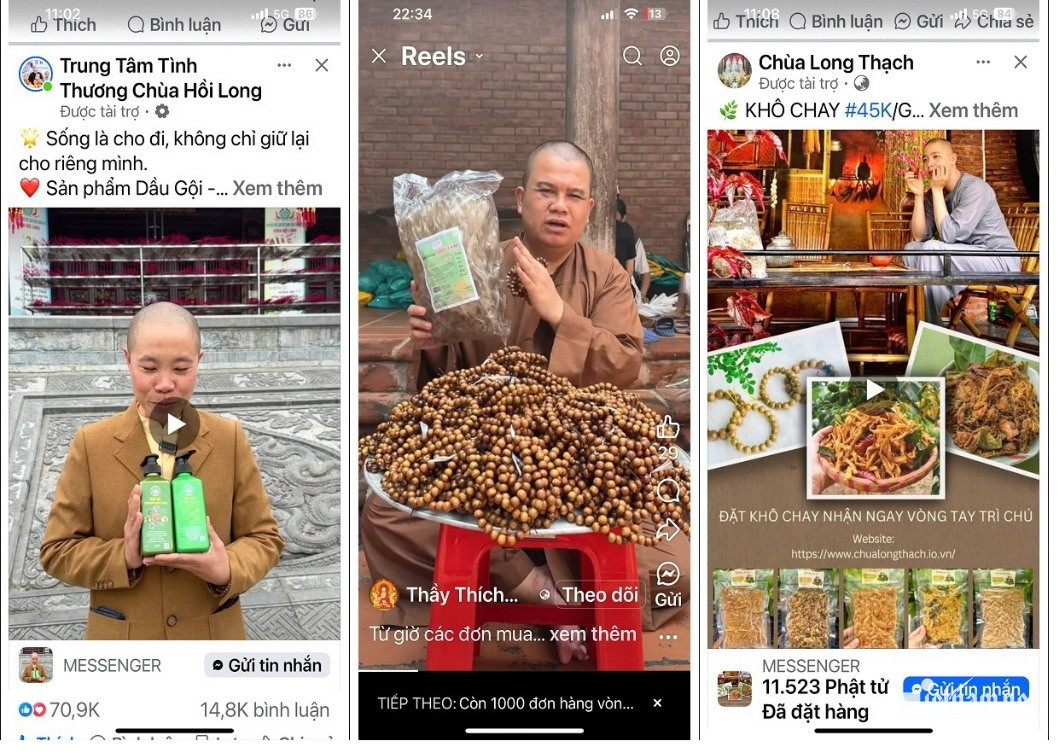
A new trend on social media involves monks and temples livestreaming to sell products to generate funds to maintain operations, renovate temples, and do charity work.
The Hoi Long Temple Social Charity Center in Hoang Thanh commune, Hoang Hoa district, in Thanh Hoa is an example. The abbot, Thich Dam Ngoan, regularly livestreams selling shampoo and conditioner made from over 30 natural herbs.
The products have been granted a patent and recognized as a 3-star OCOP (one commune, one product). All profits from the sale is used to support orphaned and disadvantaged children at the center.
Recently, daily 8 PM TikTok livestreams by Monk Thich Khai Quang from Thach Long Temple (Cong Tum hamlet, Cao Ky commune, Cho Moi district, Bac Kan province) have drawn millions viewers. Through these livestream sessions, local products like mushrooms, bamboo shoots, and noodles have reached consumers nationwide.
These videos have sparked widespread comments, with many expressing empathy and support for the monk’s honest efforts to fund the upgrading of the temple he is managing. His witty, humorous, authentic, and youthful interactions have charmed netizens, driving strong sales. Some days, he has pleaded with buyers to pause orders as he couldn’t keep up with packing.
On Thich Khai Quang’s TikTok channel, "thichkhaiquang", with nearly 700,000 followers and 2.7 million likes, the monk sells dried goods and fortune deity statues. In a video with 3.2 million views, the monk thanked supporters for backing his livestream sales. Another video, with 1 million views, revealed that alongside practicing, selling, and livestreaming, he works as a construction laborer for VND150,000 per afternoon shift.
Many people have praised this trend, saying that with the spirit of ‘good life - good religion’, monks are very sensitive and flexible in updating new technology applications, spreading the spirit of doing good deeds to the majority of people and Buddhists.
While some people argue that monks shouldn’t earn money, most people support Thich Khai Quang’s efforts, noting that his goal is to maintain his remote temple. In one video, he said many customers placed orders, but then refused products and did not pay money. However, he remains optimistic, hoping that the small temple where he practices will be filled with warmth and sympathy.
Dong Phuc Toan, Chair of Cao Ky Commune People's Committee (Cho Moi District, Bac Kan Province), confirmed that the monk in the videos posted online is Luu Van Quynh (born 1988, from Quang Ninh), who is currently managing Thach Long Temple in Cao Ky. Monk Thich Khai Quang has been practicing and managing Thach Long Temple for about 8 years.
A cautious, multifaceted perspective
According to Nguyen Ngoc Long, founder of Trang Den (Black Moon) Communications, from a social media and contemporary cultural perspective, the fact that monks livestream to sell products to sustain temples, support charity, or aid farmers reflects religion’s adaptation to digitalization and socioeconomic changes. However, this phenomenon needs to be viewed cautiously and multi-dimensionally.
In remote areas where temples face financial difficulties, leveraging digital platforms for fundraising is a legitimate and effective approach. When monks use their credibility to promote local farm produce sales and help develop local economies, this aligns with Buddhism’s engaged spirit of “propagating Buddhism to benefit all beings.”
On the other hand, livestream is carried out in a commercial space where view-chasing and engagement tactics are used to lure customers. Without clear limits and guidance, monks’ frequent appearances in sales livestreams risk blurring the line between monastic life and worldly commerce. This could provoke backlash, erode public trust, and challenge the perception of religion as a sacred, tranquil realm.
As a communication expert, Long stressed this is an image-positioning problem. When a monk participates in commercial activities, in what role is their image appearing - as a preacher, a social activist, or an individual participating in the market? If the message is not clear and consistent, it is likely to cause a media crisis, be misunderstood, and be exploited in a negative way on social networks.
“In short, this is a remarkable social phenomenon which reflects the flexibility of religion in the digital age. However, the participation of monks in livestream sales activities requires a moral framework. It needs guidance from the Buddhist Sangha, and a careful communication strategy to avoid overshadowing the nature of religious practice and public belief,” Long recommended.
Binh Minh